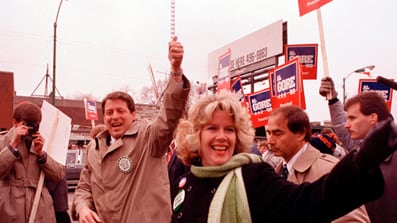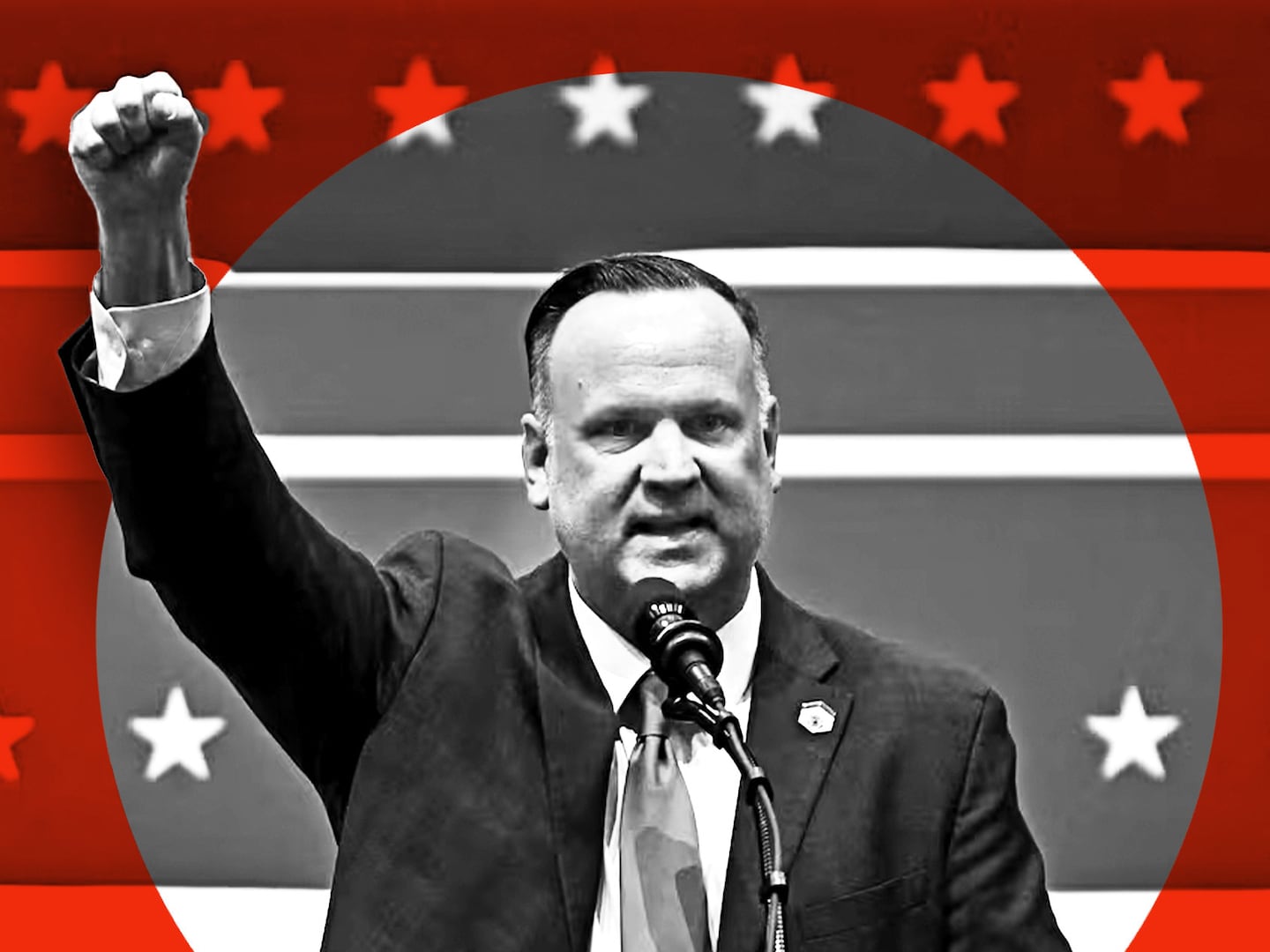Al and Tipper had a rarity in politics: a genuine partnership. Lloyd Grove reports on happier times with the couple—and what Newt Gingrich, Larry Sabato, Marty Peretz, and the pair's other friends think went wrong.
Scenes from a political marriage:
It’s a spring night in 1996. Tipper Gore is fending off an inconvenient reporter—namely me—who is attempting to interview her husband, the vice president, at a White House dinner, by pulling me onto the dance floor while Al Gore wrests my notebook and pen from my resisting hands. When Tipper is done, the veep returns them to me, having scrawled on both sides of a blue-lined page a detailed and woefully accurate account of my clumsy dance moves.
Click Image Below to View Our Gallery of Al and Tipper Gore Through the Years

A few years later, they are double-teaming me again, this time over a pitcher of lemonade, on the verandah of the vice president’s mansion. The occasion is the formal launch, two days hence, of Gore’s 2000 presidential campaign—and Tipper is sticking up for her mate against charges that he is dull and boring. “I think it’s ridiculous,” she chides me. “Tell him, honey!” Al cheers her on. “Sock it to ‘im!” Then he adds: “I love that song by Three Dog Night with that line, ‘I don’t have to speak ‘cause she defends me.’” To which Tipper offers a flirty correction: “Um, I think that was The Band.”
But don't they ever drive each other totally nuts? I asked.
"No," Al claimed. "We really don't," Tipper agreed. "I mean, that's not to say it's perfect—of course we have our disagreements." Al nodded. "We had a fight once 23 years ago."
"Which I won," Tipper said.
• Leslie Bennetts: The Gore Marriage Is Just Like Yours • Mark McKinnon: Blaming Bush for the Gore Split And then…The Kiss. At the Democratic Convention in Los Angeles, where she has just introduced him, he mounts the stage and has his way with her. Time magazine’s Lance Morrow later rhapsodized about “the sheer carnality of the kiss—the can't-wait-to-get-back-to-the-hotel-room urgency, the sexual electricity flowing south.” But as I watched in real time from the press gallery in the Staples Center, I felt no animal passion; instead it was, like the Gores’ union, at once personal and political, the comfortable smooch of a middle-aged married couple desperately seeking the White House.
Thus the announcement of their separation, a couple of weeks after celebrating their 40th wedding anniversary, comes as a rude surprise. Why now? They are grandparents in their early 60s, the parents of four attractive adult children, and ostensibly poised to enjoy the fruits of a life well-lived (and newly enriched: along with winning the Nobel Peace Prize for his crusade against global warming, Al has pocketed tens of millions of dollars since leaving public office, and they recently bought a mansion in Oprah’s ‘hood of Montecito, California). It upends the natural order of things. It does not compute.
“I am dumbfounded,” says Gore confidant Marty Peretz, the editor in chief of The New Republic who was Al’s mentor and professor at Harvard. Peretz is one of a close circle of friends who received Al and Tipper’s puzzling email Tuesday revealing the split.
“I was very shocked,” says longtime Gore watcher Larry Sabato, director of the University of Virginia’s Center for Politics. “One of the first things I tweeted was, ‘Can you believe the Clintons’ marriage has lasted longer than the Gores’?’”
Even former Republican Speaker of the House Newt Gingrich is disheartened by the news. “Sadness,” the thrice-married Gingrich says when I ask for his reaction. “I have known them for many years, and while I disagree with Al philosophically, I always thought they were a tremendous couple and I feel sad….When I saw them in private in a variety of settings over many years—because we served in the House together and when he was in the Senate and as Vice President—they were privately genuinely very nice people,” Gingrich says, “and they seemed to be deeply in love with each other.”
While the Gores weren’t just a political partnership—never mind what cynics have continually suggested—they were partners nonetheless. From the time they started dating back in 1965, shortly after meeting each other at a high school prom in Washington, they operated as a team. One witness recalls the anomalous sight, at the height of the Vietnam protests in 1968, of two earnest, public-spirited young people, sitting in the VIP section of President Lyndon Johnson’s dedication of the J. Percy Priest dam in Nashville. Al was the son of a famous Tennessee senator—ambitious, albeit deeply conflicted, about his ultimate destiny in the family business—and Tipper was his helpmate, sublimating her own career goals (to be a photojournalist, for example) in order to be a loyal wife.
They have been through quite a lot together, much of it public: his political maneuverings, her clinical depression, the near-death of their young son Albert III, who was grievously injured when hit by a car (a private ordeal that Al, with his unfortunate penchant for finding the wrong key, tried to transform into political gold in his running-mate acceptance speech at the 1992 convention), and, of course, the crushing disappointment of the Supreme Court’s questionable December 2000 decision that awarded the presidential election to George W. Bush.
After that, the vanquished former vice president put on weight and stopped shaving. “It wasn't a piece of cake,” he told me over lunch with Tipper at New York’s Gramercy Tavern, two years after the catastrophe. “I decided I was going to accept the rule of law…then Tipper and I took the longest vacation we've ever taken in our lives. That really helped a lot. By the time we got back from Europe, I was pretty much over it."
"You have to move on," Tipper added.
"That was hard, but the country moved on and I've moved on," Al said. "I also grew a beard. You may not have known that."
Releasing a public statement, rather than living apart under the radar when hardly anyone would be the wiser, is itself an act of political calculation—a bow to the Washington truism that it’s better to get bad news out all at once than have it revealed incrementally. “When you start having these things leaking out, with that drip, drip, drip, I can understand why both of them would say, ‘We don’t want that,’” says a former associate who spoke on condition of anonymity. “That’s one of the lessons you learn as a Washington couple with a high public profile.”
The associate goes on: “I don’t know if the direction their lives have taken now lends itself to the same type of partnership that they had when they were in politics and government…Al is in the air all the time—he moves around all the time, advising Apple and Google and making speeches, and I’m not sure that lends itself to what Tipper wants to be doing…What ‘separation’ means is that ‘we need some time off from one another.’ It is very deliberately not ‘we’re getting divorced.’”
Given the drama and shock of the situation, the Gores’ email to their friends is oddly reticent—one might even say stiff. "We are announcing today that after a great deal of thought and discussion, we have decided to separate. This is very much a mutual and mutually supportive decision that we have made together following a process of long and careful consideration. We ask for respect for our privacy and that of our family, and we do not intend to comment further." They sign off—jarringly, with a forced smile, reminiscent of his December 2000 concession speech: “Hope to see you soon.”
So much mystery, so little knowledge. When I try to obtain some insight from Al’s confidant and brother-in-law Frank Hunger—the widower of Al’s late sister Nancy—he cuts me off before I can even ask. “No sir you can't,” he scolds. “The message speaks for itself and I have nothing to add. Sorry, sir, that's it.” And then he hangs up.
Lloyd Grove is editor at large for The Daily Beast. He is also a frequent contributor to New York magazine and was a contributing editor for Condé Nast Portfolio. He wrote a gossip column for the New York Daily News from 2003 to 2006. Prior to that, he wrote the Reliable Source column for the Washington Post, where he spent 23 years covering politics, the media, and other subjects.






